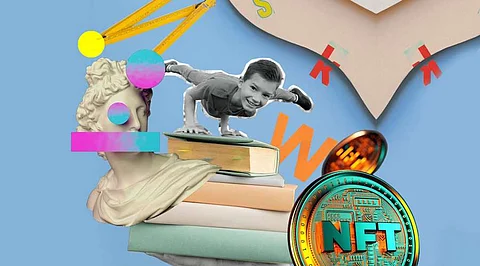

In the ever-evolving world of education, technological advancements shape and redefine how we learn and teach. One such innovation that has gained significant attention is non-fungible tokens (NFTs). NFTs are unique digital assets that leverage blockchain technology to certify authenticity and ownership. In the education sector, NFTs are revolutionizing traditional practices by digitizing certificates, creating interactive learning experiences, and offering a host of other benefits to both students and educators.
NFTs, or non-fungible tokens, are digital assets with unique characteristics that cannot be replicated. They rely on blockchain technology to verify and certify ownership, ensuring the authenticity and provenance of a digital asset. NFTs can represent digital content, including artwork, music, videos, and educational certificates. These tokens are versatile and offer diverse applications within the education sector.
Digitizing Educational Certificates: NFTs revolutionize how academic achievements are recognized and showcased. By tokenizing educational certificates, diplomas, and degrees, NFTs provide tamper-proof, easily verifiable digital credentials. This eliminates the need for physical certificates, reduces the risk of fraud, and streamlines the verification process for potential employers.
Interactive Learning Experiences: NFTs can create immersive and interactive learning experiences for students. Through virtual reality (VR) or augmented reality (AR) technology, students can utilize NFTs to access virtual environments that enhance language skills, simulate historical sites, or provide hands-on training in various subjects. This engagement and interactivity can significantly improve student participation and understanding.
Digital Portfolios: NFTs enable the creation of digital portfolios that showcase students' skills, achievements, and projects. These portfolios can be easily shared with potential employers or educational institutions, allowing students to demonstrate their abilities and stand out. NFT-based portfolios provide a secure and transparent way to verify and showcase accomplishments.
Micro-Credentials: NFTs facilitate the creation of micro-credentials, representing specific skills or knowledge areas. These tokens can be earned upon completing courses, workshops, or other learning experiences. Micro-credentials provide a granular and verifiable way for students to showcase their expertise in niche areas, making it easier for employers or recruiters to evaluate their qualifications.
NFTs offer several advantages for students and educators alike:
Security and Authenticity: NFTs provide a tamper-proof and transparent way to certify the authenticity and ownership of digital assets, including certificates and credentials. This enhances the security and integrity of educational records.
Interactivity and Engagement: NFTs can create immersive and interactive learning experiences that captivate students' attention, fostering a deeper understanding and retention of knowledge.
Verifiability: NFTs simplify verifying academic achievements for employers, institutions, or other stakeholders, reducing the risk of credential fraud and enhancing trust.
Flexibility and Versatility: NFTs can represent various digital assets and serve different educational purposes, from certificates and portfolios to collectibles and micro-credentials. This versatility allows for a wide range of use cases and applications.
While NFTs offer significant benefits, their adoption in education also presents challenges:
Technical Expertise: Developing and managing NFTs requires technical expertise, which may be a barrier for some educational institutions or educators with limited resources or technical knowledge.
Cost: Implementing NFT solutions can involve initial investment and ongoing maintenance costs, which may challenge smaller institutions with limited budgets.
Integration: Integrating NFTs into existing educational systems and processes can be complex, particularly in larger institutions with established frameworks. Integration challenges may arise due to compatibility issues and the need to restructure workflows.
Standardization: There needs to be more standardization for NFTs in education, resulting in a fragmented landscape and potential confusion among stakeholders. Establishing industry-wide standards and guidelines would facilitate broader adoption and interoperability.
Despite the challenges, the future of NFTs in education holds immense promise. As technology becomes more widespread and accessible, we can expect increased adoption and innovative applications of NFTs. Some potential future developments include:
Personalized Learning Experiences: NFTs can enable the creation of customized learning pathways tailored to individual students' needs, interests, and learning styles.
Digital Portfolios for Career Development: NFT-based portfolios can showcase students' skills and accomplishments, facilitating career development and employment opportunities.
Micro-Credentials for Continuous Learning: NFTs can support the recognition of micro-credentials, enabling lifelong learning and professional development in a rapidly evolving job market.
Decentralized Learning Networks: NFTs can contribute to developing decentralized learning environments, allowing learners to access educational resources and experiences from anywhere in the world without being tied to a specific institution or organization.
NFTs are revolutionizing the education sector by transforming traditional practices and offering new opportunities for learners and educators. From digitizing certificates to creating interactive learning experiences, the applications of NFTs in education are diverse and impactful. While challenges exist, the benefits and future potential of NFTs in education are undeniable. By embracing this technology responsibly and collaboratively, educational institutions can enhance the learning experience, increase credential security, and prepare students for the digital age.
Join our WhatsApp Channel to get the latest news, exclusives and videos on WhatsApp
_____________
Disclaimer: Analytics Insight does not provide financial advice or guidance. Also note that the cryptocurrencies mentioned/listed on the website could potentially be scams, i.e. designed to induce you to invest financial resources that may be lost forever and not be recoverable once investments are made. You are responsible for conducting your own research (DYOR) before making any investments. Read more here.
